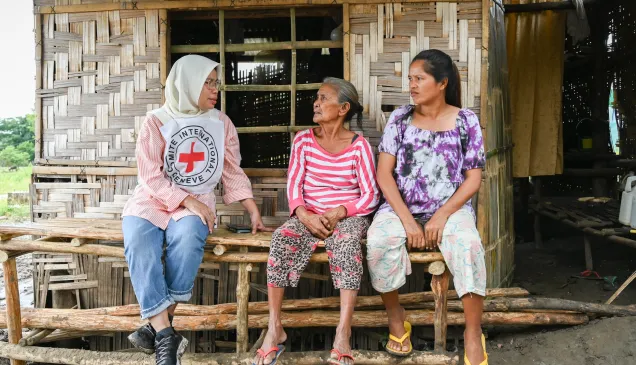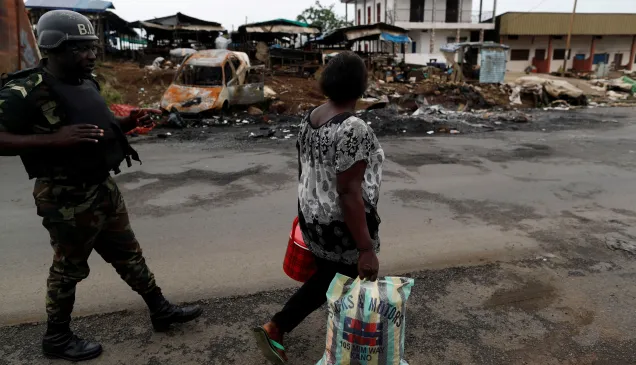Philippines: Falling in love in… and for the Red Cross
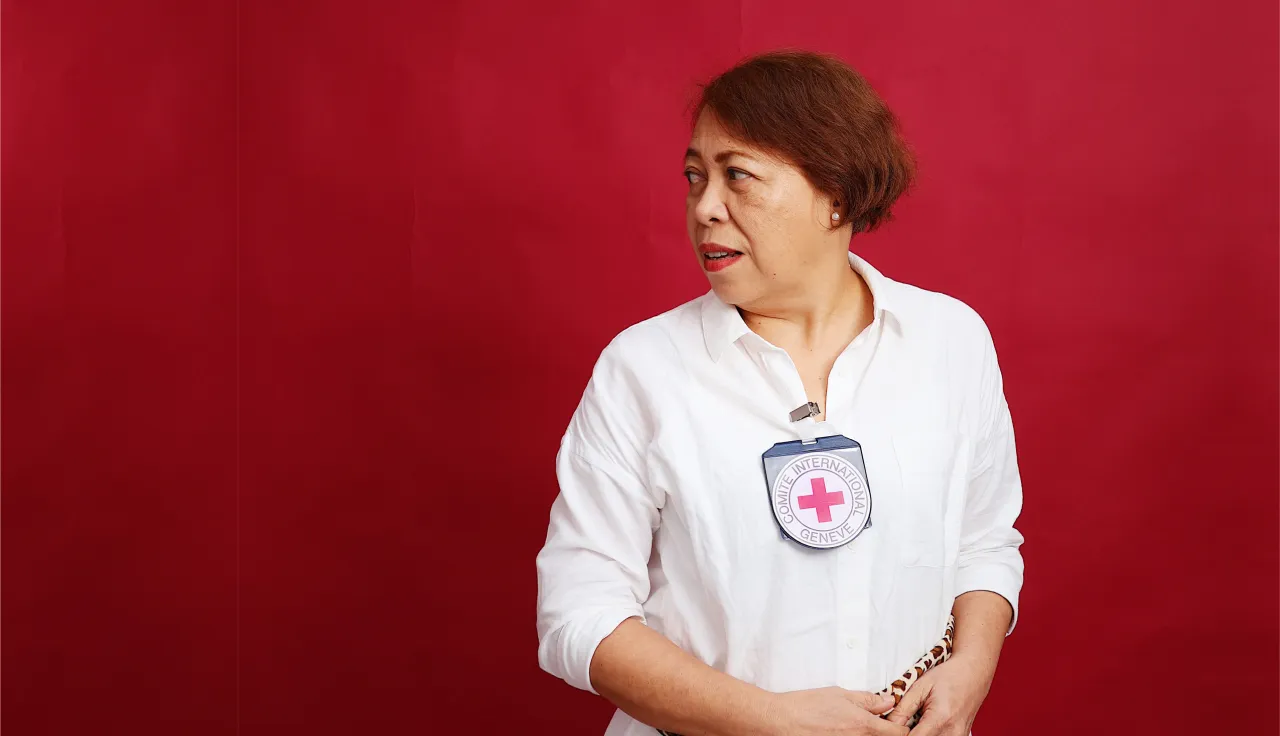
It was a whirlwind, red-letter romance.
Mariegen Sumaylo was then a 31-year-old field nurse for the Philippine Red Cross (PRC) in 1991 when she first met her colleague, Alfonsito “Fons” Balo, in Dumaguete City. Fons, a trainer for the PRC Davao chapter, was in Dumaguete to conduct a two-week training on first aid and water safety.
Their eager colleagues were quick to pair them up because Mariegen was newly single from breaking up with her boyfriend. Their colleagues even lent Fons a motorcycle, so he and Mariegen could roam around Dumaguete together.
“Alam mo ba Ate Mariegen, dalaga ka pa, at binata pa yan si Fons (You know Mariegen, you’re single, and Fons is still a bachelor),” they teased.
Mariegen recalled that once Fons’ class was done, she would help him clean the area. “I also prepared his meals since he was busy with the training,” she said.
These gestures of kindness would not go unnoticed: During Fons’ last week, he started wooing Mariegen. They decided to start dating even if they were aware that they would soon be separated, with Fons going to Davao and Mariegen heading for Cebu.
She reminisced: “When he left, I felt this emptiness in my heart.”
The two kept in touch through letters, cards, and telegrams. It was the ’90s, after all.
“We would write to each other about sweet nothings and what nots,” recounted Mariegen. “It reached the point when I became friends with the postman, as he would notify me ahead if there was a message for me.”
The two also made regular, long-distance phone calls to maintain their relationship.
After some months of getting to know each other, the couple decided to get married. There was a challenge, though: Mariegen was still living in Cebu, while Fons was transferred to Manila. Friends from the PRC came to the couple’s rescue and asked a PRC volunteer’s father – a judge – to officiate their wedding.
“Even the wife of the judge helped in preparing the documents – they organized everything,” noted Mariegen.
On 13 February 1992, the pair were married in a simple civil ceremony in Dumaguete, the city where their love blossomed. On 13 February 2025, they celebrated their 33rd wedding anniversary.

Mariegen and Fons, during a hike to Mount Batulao, pose on a mountain trail with lush green peaks in the background under a clear blue sky.
Decades of serving humanity
Mariegen admits that at first, she thought that her married life would be manageable because she and her husband were working in the same organization. But they spent most of their time on fieldwork. They also lived separately: Mariegen was in Cebu while Fons remained in Manila. Mariegen, who was then working on a programme jointly managed by the Philippine Red Cross with the International Committee of the Red Cross (ICRC), was home in Cebu only on weekends.
To make things work, the couple would compare their schedules. Whenever their assignments were close to each other, they would try to be together.
“Thankfully, our work always brought us to the same places, so we were really able to see one another,” she said.
During her stint with the PRC, Mariegen worked closely with an ICRC doctor. He offered a solution to the couple’s problem: He asked Mariegen if she would consider working for the ICRC in Manila, so she and Fons could be together.
Mariegen grabbed the opportunity. Determined to put her family under one roof, she applied for the job and unsurprisingly, was hired.
“Imagine, I was in Cebu, alone and pregnant, while my husband was in Manila. It was so difficult,” she recalled.
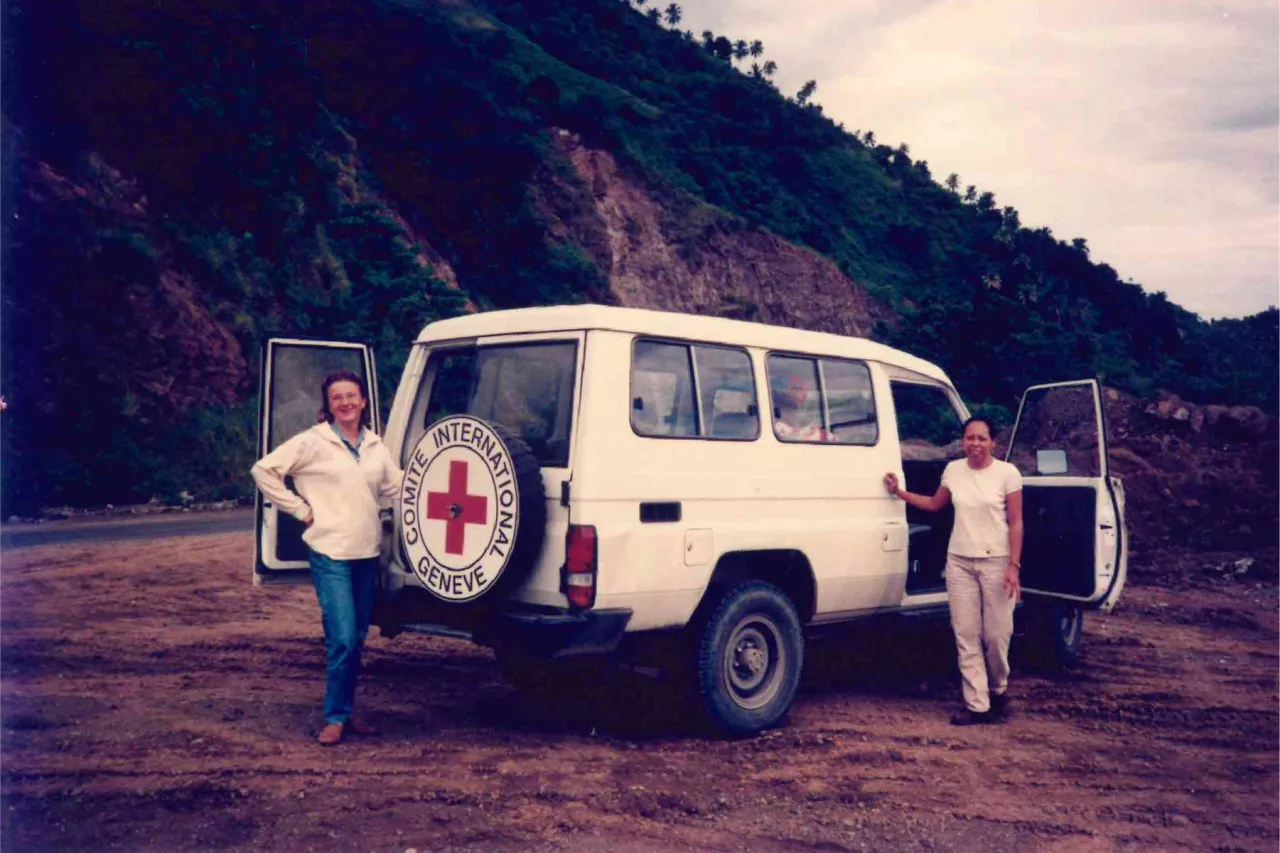
Mariegen and her colleague stand beside a white ICRC vehicle on a dirt road with green hills in the background during a field trip. ICRC
They did not know that their missing relative was well and was in jail, so when they read the message, they burst into tears. When you see them weep over news that their brother, father, are still alive – as a human being, it’s difficult not to get carried away.
Mariegen moved to the ICRC in 1993 also because she wanted to work with conflict-affected people. As a medical field officer, she visited jails to check the health conditions of detainees, especially those who were arrested in relation to armed conflicts or other forms of violence. She worked with the authorities to ensure that persons deprived of liberty (PDLs) received dignified and humane treatment.
Mariegen later transitioned into a protection field officer, where she supported the Family Visit Programme. Here, the ICRC helps PDLs re-establish and maintain contact with their relatives by facilitating their family visits in jails.
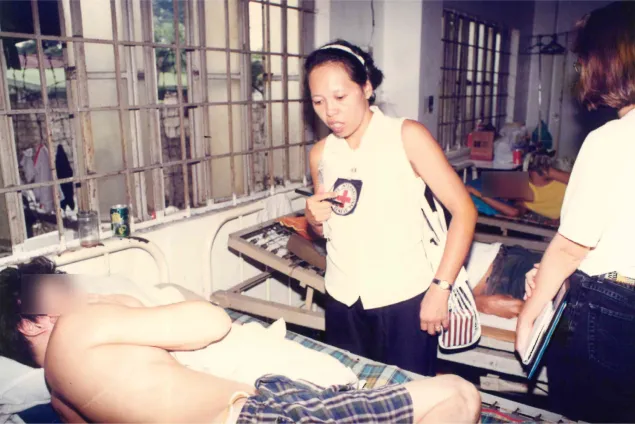
Mariegen checks on an ailing person deprived of liberty.
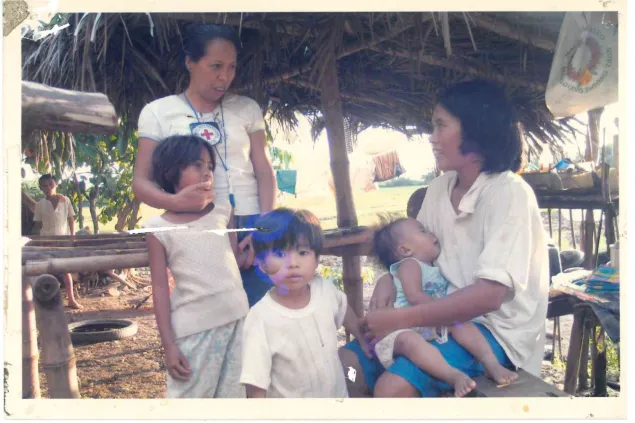
Mariegen in Occidental Mindoro, in 2004, assessing the situation of people displaced by armed conflict.
Mariegen was responsible for reaching out to the families of PDLs to inform them about the programme. She also facilitated the exchange of Red Cross messages, which help detainees reach out to their family members and share news. These messages are delivered to recipients with the help of the PRC’s wide network.
This job made her witness heartwarming moments. She remembers an instance when she delivered a Red Cross message to a family.
“They did not know that their missing relative was well and was in jail, so when they read the message, they burst into tears. When you see them weep over news that their brother, father, are still alive – as a human being, it’s difficult not to get carried away,” she said.
For Mariegen, all the cases that she handled under the Protection of Family Links programme are memorable. “I’m happy that I’m a part of the reconnection of families,” she said.

Mariegen in a white shirt poses in four different ways against a red background, wearing an ICRC identification badge.
In the ICRC, you are given the opportunity to help people affected by armed conflict. Our work allows us to bring tremendous impact. The gratitude from affected people gave me so much fulfillment.
Coming full circle
In 2024, after 35 years of working for the Red Cross, Mariegen retired. On the days leading to her last day at work, Mariegen did the things she was passionate about, for the last time.
She dropped by the PRC headquarters in Mandaluyong City to share information materials about the Protection of Family Links programme. Just a few minutes after entering the premises, Mariegen was greeted like a celebrity by PRC staff who have become her friends. The visit to the PRC, where Mariegen began, was a full circle moment for her.
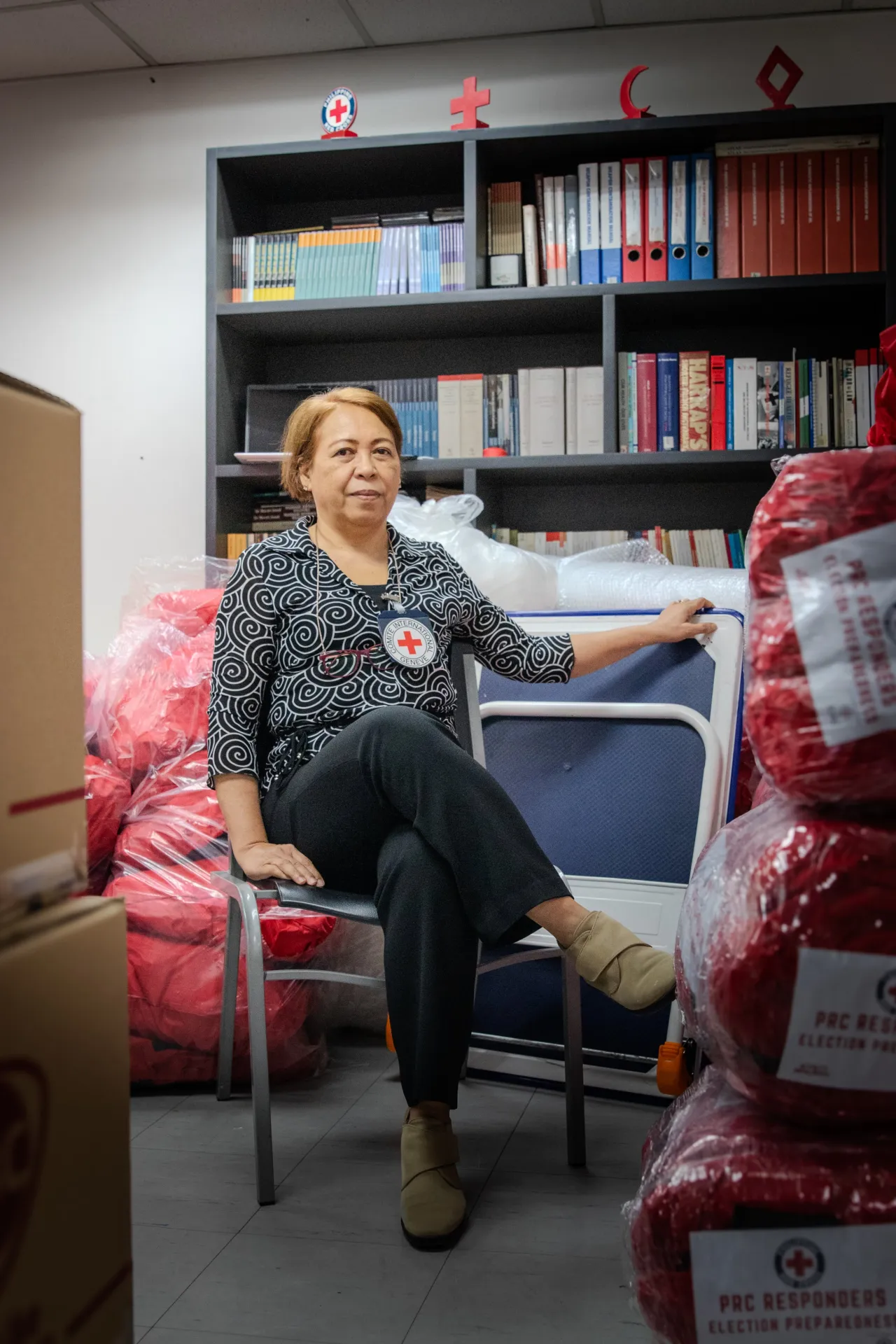
Mariegen Balo inside a room at the Philippine Red Cross headquarters.
On her final working day on the 19 December 2024, Mariegen visited the Laguna Provincial Jail to assist in the distribution of hygiene kits to over 700 detainees. Mariegen stood on a bench so she could be heard by the detainees.
“Our hope is that you would use this (hygiene kit) for your own good,” said Mariegen prior to giving away the kits. She also spoke to some detainees to understand how they were doing, as well as talk about the ICRC’s support for them.
Her face lit up at the end of the activity. With the biggest smile, she gushed: “I’m done, I’m done! I’m happy. I just have to return my laptop and phone.”
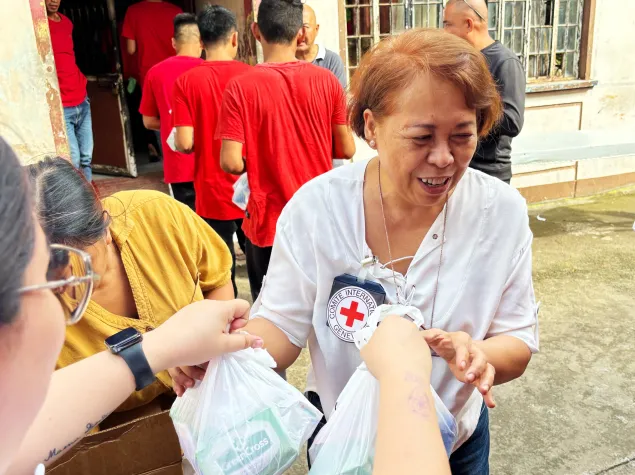
In December 2024, Mariegen helped in distributing hygiene kits to 700 detainees at the Laguna Provincial Jail.
And just like that: Mariegen, now 65, wrapped up over three decades of her life with the Red Cross. She will be going back to Surigao City, where she will settle with Fons and tend to a backyard vegetable garden. Ever the humanitarian, she plans to help empower her town’s out-of-school youths by teaching them skills, like playing the piano.
What made her stay this long in the Red Cross, instead of seeking greener pastures abroad, like thousands of other Filipino nurses?
“In the ICRC, you are given the opportunity to help people affected by armed conflict. Our work allows us to bring tremendous impact. The gratitude from affected people gave me so much fulfillment,” she said.

